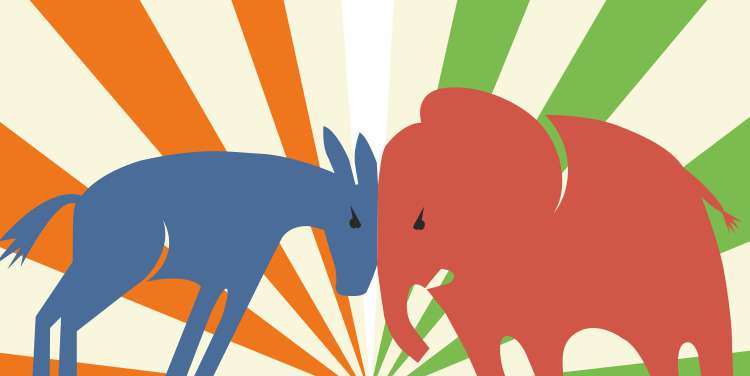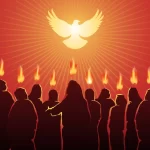No point paraphrasing Paul, the Roman, or challenging Socrates’s “I am a citizen, not of Athens or Greece, but of the world”.
There is no getting away from politics, whether one is a believer, an atheist or a little of both.
It is perhaps simpler in a country which is homogenous, Sweden perhaps, or Iceland, or Papua New Guinea. And Saudi Arabia. You are always part of the majority, or else a visiting worker, a tourist or a transient, thinking always of “back home” with little or no interest in trying to shape the world around you. Saudi Arabia will not allow you to do so. Its rules are clear. You have to be citizen, a Muslim, to have a voice in matters of state; perhaps not even then if you are a woman, a landless nomad or less than a grade-C prince.
The others? In the first quarter of the 21st century, rising right-wing nationalism, a rapidly fluctuating economy, a trenchant xenophobia best illustrated in United States’ President Donald Trump’s colourful vocabulary, makes political choices by even “different” looking citizens very difficult, and the future of “minority communities”—ethnic, religious or sexual—very challenging.
So, what about a Christian, Catholic, Protestant or “Independent” in a country such as India? Does theological commitment limit or expand choices, and does the Christian—subdivided—have a choice other than going with whichever way the majority goes lest she or he be seen as a dissenter, a maverick, or worse, an anti-national and a traitor ungrateful to the host who has “tolerated” him or her for so long, given a chance to live, possibly even to thrive.
Since the year of Independence in 1947, the ideal minority communities presented before us by people in power, or even by the teacher in the class, are the Parsis. They have “mixed like sugar in water, invisible, but sweet”. Not the Jains and the Buddhists who are denied the luxury of an independent existence as religions but always defined either as part of Hinduism, or some sort of reformist sects that are never too far away from the mother faith, irrespective of the historicity of Gautama Buddha and the Jains. The Buddhists and Jains have not protested too much, unless it comes to rights under the modern constitution of the nation, specially to run educational institutions.
The situation of the Sikhs has changed somewhat in recent history. Despite the Sufi influences that Guru Nanak coalesced in his philosophy of a universal brotherhood, and which Guru Gobind Singh distilled in a more organised and regimented and recognisable Khalsa centuries later, the majority has sought to limit the Sikhs into a comprehensible group. Collectively, a newly minted term “Indic religions” has been used to basket them as a homogenous socio-politic community.
As Christians, we are called upon to be political. We must take part in all aspects of politics, by joining parties of our choice, based on our political predictions and economic and social objectives. We must contest elections from the panchayat to Parliament.
Nanak may have had Muslim companions and followers, but the confrontation between several of his successors and the Muslim overlords ruling the northern plains made it convenient to list them as the sword arm of the majority faith—defenders of the Brahmin and the cow. The British tried hard to keep them separate, but the separation came much after they had gone back home to old Blight.
The tragic events of the 1970s and 1980s, from the rise of the demands of Khalistan and the advent of the militant self-styled marshal Jarnail Singh Bhindrawale, the targeted murder of Hindus, including big businessmen, the garrisoning of the holy places of worship, Indira Gandhi sending in the army into the Golden Temple to eliminate them, her own assassination within months, and the massacre of perhaps more than 5,000 innocent Sikh men and boys in the streets of Delhi and other towns has forever marked them out as different, now a part of the “minority group” in many meanings of the term.
India is a constitutional Republic, with a written statute, often touted as among the best in the world. Its core values are freedom of conscience, liberty, the right to life, the freedom of faith and expression. Courts have defined the terms to include the freedom to practice, profess and propagate faith, perhaps even change it or renounce it as atheists and communists routinely do.
Indira Gandhi got the term secular included in the preamble of the constitution. However, Jawaharlal Nehru had defined it best as not a separation of state and church as in Western Europe after the Dark Ages, but an equidistance from religion or religions. India had many major religions, Hinduism, Islam, Christianity, to name the big ones and many others in regions across the vast land, and equidistance was important.
India remains a Hindu majority nation, with just under 80 per cent of the population defined as Hindu. Interestingly there is no legal definition of Hinduism—it is a “way of life”, as the Supreme Court once deftly called it. But many other religions are classified with it. Marriage and succession laws of Sikhs and Buddhists, for instance, are governed by Hindu laws. Effectively, the Hindu ethos govern the land. There is no getting away from it.
Even a cursory look at the Constitution throws this up with some clarity. Many pre-Independence princely states had and several post-Independence states still have laws that cleverly ban conversion to Christianity under the guise of preventing the use of fraud and force by powerful and rich Christian pastors working on poor and emaciated people in forests and villages. Long before the ban on cow beef, the Holy Cow had been holy in the Constitution; its welfare, though not its worship, found a mention in the Directive Principles. Tribals of the Central Indian or Chhota Nagpur region are, whether they like it or not, classified as Hindus unless they come out and say they are Christians or of some other faith.
Citizenship itself is a political position. Political activity does not mean disobeying the government, the ruler.
Army regiments, military war cries, and ceremonies have a religious fervour, and recruitment patterns since 1947 have had a distinct singularity. There may be many Anglo-Indians who have done India proud in the Air Force and many Christians still serve in the Army, there are even Muslim generals, but you can count them without too much difficulty.
Above all, there is the Presidential Order of 1950 which laudably gives affirmative action to people once deemed to be untouchables, but for some mysterious reason, says they have to remain Hindus, or Sikhs or Buddhists, if they are to get political empowerment and ease in education.
There is no getting away from the fact that religion also permeates Indian politics. This has nothing to do with the hate that Narendra Modi, our current prime minister, his party men and cohorts mouth. Repeatedly, almost every year, we have seen that if a new law gets a religious veneer, every political party other than perhaps the communists and some southern and northeastern groups, will keep pace with each other in supporting it. The most recent example was the Act that made the socially privileged but economically disadvantaged people demand and get 10 per cent reservation in jobs and education, more than the Tribals and as much as two thirds of the Dalits who for 3,000 years were forced to such jobs as lifting human excreta and skinning dead cows.
Empirical evidence suggests that the state’s attitude towards minority religious communities has hardened in the seven decades since the Partition of India and Independence from the colonial British Raj in 1947, and the promulgation of a secular Constitution in 1950. As mentioned, the Presidential Order of 1950, among the first amendments of the new statutes, took away the freedom of faith of Dalits, confining them to Hinduism at pain of withdrawal of protection from caste subjugation, and denial of some material benefits. Educational rights were systematically trimmed in successive decades, proselytization barred, and evangelisation and empowerment of the poor put under strict surveillance.
From the mid 1970s, in the wake of the Khalistan movement for an independent Sikh state in the Punjab, subtle but powerful alignments took place within the majority community, with massive communal polarisation in the country, specially its northern and western provinces.
The march to Ayodhya in the pursuit of a Ram temple in the pilgrimage town by the Bharatiya Janata Party leader Lal Krishan Advani, deputy prime minister from 1998 to 2004, supported by the Rashtriya Swayamsewak Sangh, led to an assault on the 500-year-old Babari Mosque at that place, and its demolition, triggering a series of events in which thousands have died, a majority from the Muslim community.
This, in turn, has opened the country to radicalisation of both Hindus and Muslims. The noted jurist, Fali Nariman, famously said that Hinduism had changed from the one he had known all his life. And, Islamic youth are now under scrutiny for possibly succumbing to the propaganda of the Islamic State or Daesh ravaging the Middle East. This consequently has a trickle-down effect on all religious groups.
The Supreme Court of India, and the Election Commission, have reaffirmed the ban on the use of religion in election campaigns, labelling it a corrupt practice. But the 2013–14 campaign that eventually propelled Mr Narendra Modi to the prime ministership of the country was itself deeply rooted in a base and malevolent appeal to the religious sentiments of the majority community. His campaigners carried out a vicious propaganda against Muslims and Christians; calls were made for their disenfranchisement, even sterilisation, to reduce their population. The same polarising rhetoric was repeated in Parliament; a recurring theme was for a ban on conversions.
The 2018–19 environment remains surcharged. The incitement to violence continues, as does the impunity, with government officials and police closing their eyes and ears to the slogans. They refuse to record violence, are tardy and slipshod in investigations, and shoddy in prosecution.
Recent data, collected for the civil rights submission to the United Nations Human Rights Council Universal Periodic Review, brings this out in a startling manner. Just in 2016, there have been more than 350 cases of violence of various kinds against the Christian community alone. The number of unreported violence is anyone’s guess, as indeed is the totality of violence, by state and non-state actors, against the Muslim community. The 2018–19 data is no different.
One must be functionally political to be a citizen in India. Citizenship itself is a political position. Political activity does not mean disobeying the government, the ruler. It does not mean defying the Book which says God appointed men to rule over us, and to give Caesar what is due unto Caesar.
Political activity also does not mean asking Mrs Sonia Gandhi for a ticket to the Lok Sabha, or joining Mr Modi in the hope that, as a token, some crumbs will come a Christian’s way.
Politics is a celebration of our place in our motherland, and in our democracy. It is the mechanics of expanding our freedom, or placing our concerns before the institutions of state, Parliament, assemblies, municipalities and courts of law. It is through our participation in the political processes, of which elections are but a part, that we celebrate our nationality, and our nationalism.
As Christians, we are called upon to be political. We must take part in all aspects of politics, by joining parties of our choice, based on our political predictions and economic and social objectives. We must contest elections from the panchayat to Parliament. And, above all, we must voice our concerns without fear. That is politics. That is what Paul meant.






